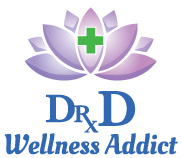“Eat right. Not less.”
-Dr. D
A poor diet kills more people worldwide than smoking, making it one of the most important behaviors you can control to impact your health – including boosting your immune system. Although all nutrient-dense plants have their benefits; some are so powerful they have been used as medicine for centuries in practices like Ayurveda, including to strengthen the immune system and prevent infection. I chose foods with established scientific evidence supporting their use in the treatment of chronic disease, particularly the targets for COVID-19 – diabetes, high blood pressure, and heart disease. Here are my top 5:
1. Mushrooms
Mushrooms have been used as medicine since 3000 BC, specifically for their antimicrobial, anti-inflammatory, cardiovascular protective, antidiabetic, liver protective, and anticancer properties. Mushrooms are of particular interest in cancer research, where the past 40 years of science has demonstrated their ability to slow tumor growth, regulate tumor genes, decrease angiogenesis or tumor blood flow, and increase the destruction of malignant cells. A variety of mushrooms have been studied, including reishi, miatake, chaga, and shiitake. Although the mushrooms I am talking about are not hallucinogenic, psylliciban has been recognized by the FDA as a breakthrough treatment for depression. Try these “Mushroom Tacos” or explore products like Four Sigmatic (available on Amazon), which I love for traveling.
2. Garlic
For centuries garlic has been used for its anti cancer, cardiovascular risk reducing, anti-microbial, properties. Garlic has also been shown to be more effective than antibiotics in treating the most common bacterial food-borne illness. The active ingredient in garlic, allicin, is cardioprotective and antidiabetic. Allicin becomes activated when the cloves are crushed, so try to use fresh garlic. Although raw is also best for therapeutic purposes, consider adding garlic at the end of sautéing like in Meditteranean cooking, to preserve its medicinal properties. Check out my “Baked Garlic” recipe – it’s both versatile AND delicious!
3. Leafy Greens and Cruciferous Veggies
Dark leafy greens and cruciferous plants like broccoli and cauliflower are at the top of the Aggregate Nutrient Density Index score for a reason! These and other plants of the Brassica genus contain several compounds (ex: flavonoids) with a variety of biological effects, such as anticancer, anti-inflammatory, and gene regulating properties. These plants are used widely in Eastern Medicine, including for the prevention of viral infection. Epidemiological studies have linked a high intake of these vegetables to reduced risk for chronic disease, including different kinds of cancer. They even favorably impact epigenetics – meaning they can change your genes! Drink a green smoothie everyday and try switching from traditional rice to broccoli or cauliflower rice, so popular now you can find them in the freezer section!
4. Ginger
Ginger contains several bioactive compounds with many therapeutic functions, due to their antioxidant, anti-inflammatory, antimicrobial, and anticancer properties. Because of its extensive biological profile, ginger is an herb used to assist with the unwanted effects of aging and degenerative diseases. It’s even used as a supplement for poultry feed for its positive effects on body weight, reproductive performance, egg and meat production and quality, and improved microbiological aspects (reduced need for antibiotics). Grating fresh ginger root into tea or plain hot water has been shown to have antiviral effects.
5. Turmeric
Curcumin, the primary active ingredient in turmeric, is a known anti-infective (including antiviral), anti-oxidant, anti-inflammatory and anticancer compound. No wonder it has promising scientific evidence in over 25 inflammatory based conditions, including cardiovascular disease, depression, chronic stress, and Alzheimer’s. Consuming as little as ½ to 1 teaspoon a day can derive health benefits. Curcumin is better absorbed with black pepper and fat. Consult with your doctor before adding turmeric, as it can interact with certain medications like blood thinners. Try this “Ginger-Turmeric Tea” or “Ginger-Turmeric Salad Dressing”!
